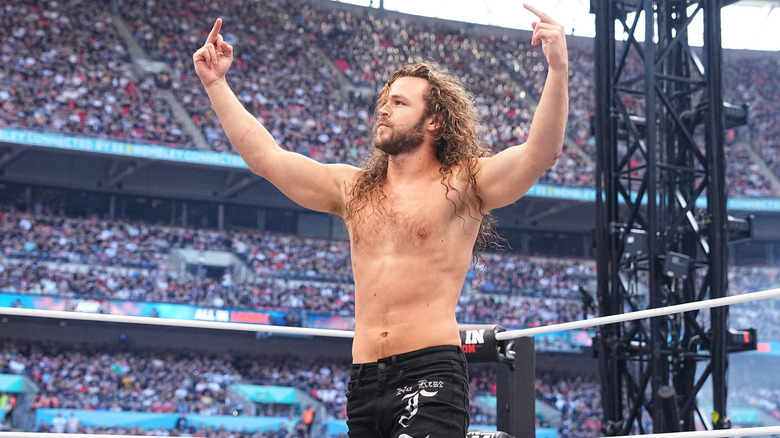
On January 24, AEW wrestler Jack Perry filed to trademark the term “Scapegoat,” which he used during his surprise appearance at NJPW ‘Battle In The Valley’ earlier this month.
You can check out the official trademark description below:
“Entertainment in the nature of wrestling contests; Entertainment services, namely, wrestling exhibits and performances by a professional wrestler and entertainer; Entertainment services, namely, live appearances by a professional wrestler and sports entertainer; Entertainment services, namely, personal appearances by a professional wrestler and sports entertainer; Entertainment services, namely, televised appearances by a professional wrestler and sports entertainer; Providing wrestling news and information via a global computer network; Providing online interviews featuring a professional wrestling and sports entertainment personality in the field of professional wrestling and sports entertainment for entertainment purposes.”
In a recent interview with “ROCK 106.1,” former TNT Champion Darby Allin recalled a conversation with Ric Flair asking him to slow it down in the ring.
Allin said, “Ric Flair, a couple weeks ago, he came up to me and is like, ‘Darby, you need to slow down.’ I’m like, ‘Wait, what?’ ‘You’re crazier than Mick Foley.’ I’m like, ‘Getting advice from Ric Flair?’ What’s funny is, people don’t know how great I feel physically. I feel amazing, like nothing hurts. DDP also, he’s like, ‘We have to put you in a lab. They have to test you out and see what’s going on because you’re not human.’ I feel amazing. I won’t stop doing it. Sorry for anybody trying to give me advice, all the people out there telling me to slow down. I can’t and I won’t.”
AEW Wrestler Jack Perry Seeks Trademark for “Scapegoat” Term
In a surprising move, All Elite Wrestling (AEW) wrestler Jack Perry, also known as Jungle Boy, has filed for a trademark for the term “Scapegoat.” This comes after his recent appearance at NJPW’s ‘Battle In The Valley’ event earlier this month, where he used the term during his performance.
The official trademark description for “Scapegoat” includes various entertainment services related to professional wrestling and sports entertainment. These services encompass wrestling contests, exhibits, and performances, as well as live and televised appearances by Perry. Additionally, the trademark covers providing wrestling news and information online, along with interviews featuring Perry in the field of professional wrestling and sports entertainment.
This move by Jack Perry to trademark the term “Scapegoat” indicates his intention to establish a unique brand identity within the wrestling industry. By securing the rights to this term, he aims to protect his intellectual property and potentially capitalize on its commercial value in the future.
In a recent interview with ROCK 106.1, former TNT Champion Darby Allin shared an interesting anecdote about a conversation he had with wrestling legend Ric Flair. Flair advised Allin to slow down in the ring due to his high-risk style of wrestling. However, Allin expressed his reluctance to heed this advice, stating that he feels physically great and won’t stop pushing himself in the ring.
Allin’s refusal to slow down and his determination to continue performing at an intense pace aligns with the high-energy style that has made him a fan favorite in AEW. Despite concerns from others about potential injuries or long-term physical damage, Allin remains committed to his craft and believes in his ability to withstand the demands of professional wrestling.
The trademark filing by Jack Perry and the conversation between Darby Allin and Ric Flair highlight the unique challenges and choices faced by professional wrestlers. Balancing the desire to entertain fans with the need to prioritize personal well-being and longevity in the industry is an ongoing struggle for many performers.
As AEW continues to grow in popularity and challenge the dominance of other wrestling promotions, such as WWE, it is not uncommon for its wrestlers to seek trademark protection for their personas, catchphrases, or signature moves. This allows them to establish a distinct brand identity and potentially monetize their intellectual property through merchandise sales or licensing agreements.
It remains to be seen how Jack Perry’s trademark application for “Scapegoat” will progress and whether it will lead to any significant commercial ventures. However, this move demonstrates his proactive approach to building his brand and capitalizing on his popularity within the wrestling community.
As the wrestling landscape continues to evolve, intellectual property rights and branding strategies play an increasingly important role in the success and financial stability of professional wrestlers. Trademark filings, like the one made by Jack Perry, serve as a reminder of the business side of the industry and the wrestlers’ efforts to secure their place in the ever-changing world of sports entertainment.
